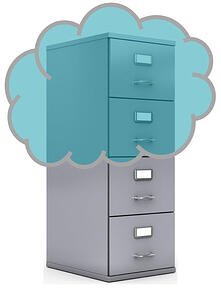What Happens to Your EHR Software Data When It’s in the Cloud?
To start off the month of June, we’re introducing a new theme on the Uprise blog! This month, we’re going to teach you everything you need to know about the cloud! And today, we answer a common question most people have about the cloud. What exactly happens to your data if your EHR software is in the cloud?
Data in Your Cloud-based EHR Software
 Picture a classic filing cabinet: crammed full of paper, bulky drawers, and files; tucked away, gathering dust, and taking up valuable office space. You want to move all your data to the computer, but what happens if your office computers crash? Or you run out of space on your computer? Luckily, the cloud works to combat all of these issues.
Picture a classic filing cabinet: crammed full of paper, bulky drawers, and files; tucked away, gathering dust, and taking up valuable office space. You want to move all your data to the computer, but what happens if your office computers crash? Or you run out of space on your computer? Luckily, the cloud works to combat all of these issues.
Many people do not fully understand the concept of “the cloud.” Where does the data that you are storing go? Is it secure? Will you be able to access it when you need it? The explanations can be a little complicated, so we are here to offer a more simplistic solution to understanding how the cloud works.
Continuing with the filing cabinet metaphor, take a minute to imagine all of those bulky files you see every day, but instead of crowding your office, they are in a warehouse far, far away from you, yet at the push of a button, they appear at your fingertips. When you store data in the cloud, it is broken down into tiny files, encrypted, and sent through a network of data centers where it is kept safe and secure, just like locking up files in your office. Except that instead of a locked door, reputable cloud computing vendors host their systems in facilities that have security controls with certifications that many practices cannot afford on their own.
In these data centers, your information is stored on servers, which you can imagine as massive, electronic filing cabinets containing millions of teeny-tiny files. Instead of holding your patients for just the past year or two, a server can hold complete records of all your patient data, filed away, yet still accessible at the simple click of a button.
Especially when handling healthcare data, it is imperative that your records be secure in order to be HIPAA compliant. Fortunately, when you use the cloud to store medical data, the company providing the EHR software must first meet HIPAA qualifications, and accept liability for your data. It is secured 24/7 and they are required to notify you if anything goes wrong. The top providers also include written guarantees with serious penalties should your data be compromised in any way. Since cloud computing is the main service offered by these companies, they take over the job of keeping your files safe so you can focus on providing your patients with superior service.
Stay tuned for more cloud information on our blog all month. But if you’re looking for some basics on the cloud, watch our on-demand Tech Talk webinar.

